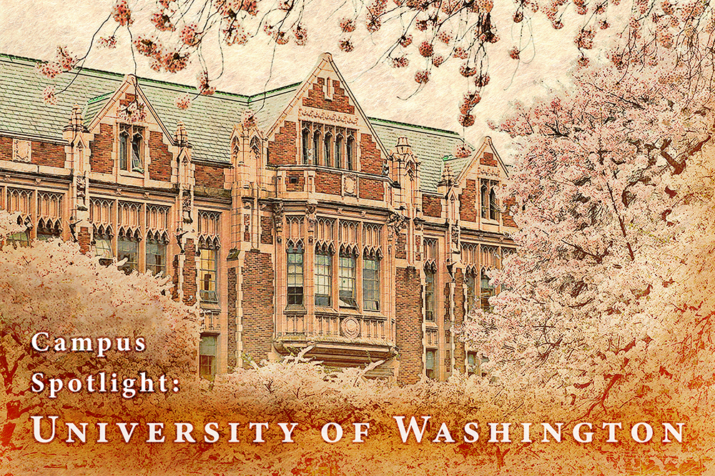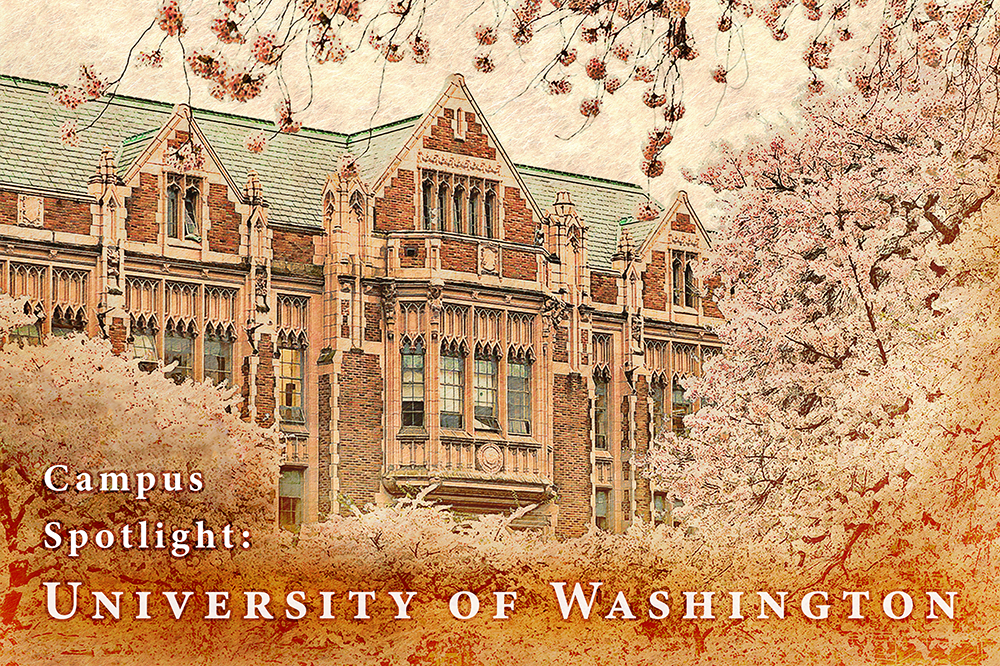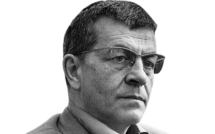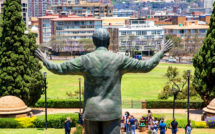

An introduction to our campus spotlight on the University of Washington.
Located in the heart of Seattle, the University of Washington (UW) has long been a leader in the emerging field of digital humanities (DH). Kathleen Woodward, Director of the Simpson Center for the Humanities,[1] has led the vision behind this institutional commitment since the early 2000s, when there was, she describes, “a spontaneous combustion” of interest in the field among UW faculty. Across campus, humanities researchers were engaged in projects that made use of digital technology to reach vital, public audiences for their work. For Woodward, these early projects convinced her that the digital humanities and the public humanities were convergent, complementary undertakings. How then, could the institution support scholarly communication in all its forms, rather than just traditional notions of publication? In 2008, the Simpson Center received and successfully funded a National Endowment for the Humanities challenge grant that provided support, space, and opportunity for collaboration between scholars working in DH across the University of Washington. Since then, the Center has grown to become a hub—both on UW’s campus and nationally—for digital humanities work.
DH has much to offer humanities scholars and students. The possibilities are vast. There are new tools and methods for data mining, distance reading, and ways to visualize information. But UW’s early interest in and commitment to the ways that digital humanities and public humanities converge has shaped an institutional culture that now supports DH at the Simpson Center but also in the University Libraries, across individual departments, and in various other interdisciplinary programs and research centers. Woodward reflects that “we are in a revolution when it comes to research and how it is created, circulated, and housed.” These revolutionary possibilities have led multiple generations of UW scholars to imagine new possibilities, directions, and audiences for their work, and to prepare students to bring critical perspectives to bear on the technologies that make these projects possible.
This spotlight presents several different reflections on the role of digital humanities in public scholarship and teaching, each drawing on projects that are underway in European studies at the University of Washington. Adrian-Kane Galbraith (Doctoral Candidate in History) offers a thoughtful and moving reflection on the benefits and challenges of archival digitization and text-searchable databases for writing trans histories of modern Britain. Advanced metadata, optical character recognition, and keyword searches of digital records have enabled researchers to close some of the “archival gaps” that have shaped the ways trans histories and historiographies have been told. Yet, even as these technologies make research and public engagement easier and more accessible, Kane-Galbraith writes, they raise complex ethical questions about language, naming, terminology, and visibility for the trans community.
Next, we feature an interview with Makena Mezistrano (Assistant Director of the Sephardic Studies Program at the Stroum Center for Jewish Studies) and Ben Lee (Doctoral Candidate, Paul G. Allen School for Computer Science & Engineering) who have worked together to make Ladino (Judeo-Spanish) language sources more accessible to scholars and to Seattle’s vibrant Sephardic diaspora community. Working across interdisciplinary lines, they are working to enhance the Stroum Center’s digital collections by building a crowdsourced transcription platform for Ladino documents and by extracting visual context from Ladino newspapers with Lee’s tool Newspaper Navigator. Both projects are designed to use DH to build community around a language and tradition that has been historically silenced. We also speak with filmmaker Eileen Jerrett (director of the acclaimed documentary film Blueberry Soup), Cricket Keating (Associate Professor in Gender, Women, & Sexuality Studies), and Katrín Oddsdóttir (who sat on the 2011 Icelandic Constitutional Council) about their work on KRIA (the Icelandic Constitution Archives), which is partly based at UW. KRIA is a collaborative project that works to engage public audiences in the process of preserving archives related to the uniquely public 2011 effort to reform the Icelandic constitution. Using a wide range of DH communication and preservation methods, they crowdsource and collect material related to the reform movement and engage broad audiences in Iceland’s unique story.
These projects exemplify creative thinking about the relationship between the digital and the public. But how to engage our students in these same questions? Geoffrey Turnovsky (Associate Professor of French) introduces UW’s new interdisciplinary minor in Textual Studies and Digital Humanities, designed to help students think critically about the revolutionary changes in reading, research, and the ways we encounter texts in the digital world. The minor introduces frameworks that will help students think through these massive changes while also giving them the practical skills they need to work with both material and digital texts, and to apply their expertise in a variety of contexts both as students and after graduation. Other projects show how similar topics can also be incorporated into individual courses. Laurie Marhoefer (Associate Professor in History) and I (Taylor Soja, Doctoral Candidate in History) share the syllabus for Digital World Wars, a pedagogical project and lecture course that we co-instructed the first time in Fall 2020, and which brought DH topics into a large lecture setting. We reflect on the challenges and successes of introducing a wide range of students to topics in digital and public history, and offer encouragement and advice for instructors considering teaching similar courses.
Campus Spotlight: The University of Washington
-
“Preserving Sephardic History through Interdisciplinary Collaboration: An Interview with Makena Mezistrano and Ben Lee” by Taylor Soja
-
“A Participatory Archive to Document a Participatory Constitutional Process: An Interview with Cricket Keating, Katrín Oddsdóttir, and Eileen Jerrett” by Taylor Soja
-
“What’s in a Name?: Metadata, Digital Ethics, and the Making of a British Trans Archive” by Adrian Kane-Galbraith
-
“Exploring the Challenges of the ‘Digital Revolution’ in a New Minor in Textual Studies and Digital Humanities at the University of Washington” by Geoffrey Turnovsky
-
“Bringing Digital History to Large Undergraduate Courses: Teaching ‘Digital World Wars’” by Taylor Soja and Laurie Marhoefer
-
“Syllabus: Digital World Wars” by Taylor Soja and Laurie Marhoefer
Taylor Soja is a PhD candidate in British and imperial history at the University of Washington, and beginning in fall 2022 Assistant Professor of History at Illinois State University. Her work has appeared in Gender & History, and her research is funded by a Mellon – Council for European Studies Dissertation Completion Fellowship. She is also committed to digital and public history, and co-directed the project Digital World Wars.
[1] https://simpsoncenter.org/
Published on April 18, 2022.




